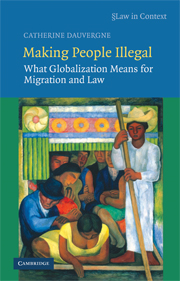Book contents
- Frontmatter
- Contents
- Acknowledgments
- Publication acknowledgments
- 1 Introduction
- 2 On being illegal
- 3 Migration in the globalization script
- 4 Making asylum illegal
- 5 Trafficking in hegemony
- 6 The less brave new world
- 7 Citizenship unhinged
- 8 Myths and Giants: The influence of the European Union and the United States
- 9 Sovereignty and the rule of law in global times
- Bibliography
- Index
- The Law in Context Series
- References
7 - Citizenship unhinged
Published online by Cambridge University Press: 05 June 2012
- Frontmatter
- Contents
- Acknowledgments
- Publication acknowledgments
- 1 Introduction
- 2 On being illegal
- 3 Migration in the globalization script
- 4 Making asylum illegal
- 5 Trafficking in hegemony
- 6 The less brave new world
- 7 Citizenship unhinged
- 8 Myths and Giants: The influence of the European Union and the United States
- 9 Sovereignty and the rule of law in global times
- Bibliography
- Index
- The Law in Context Series
- References
Summary
Changes in migration laws, whether formalized or discretionary, reverberate throughout citizenship law. Like migration laws, citizenship laws in prosperous Western states are displaying an increasing similarity at present, with more states permitting dual citizenship and more states opting for citizenship rules that come somewhere between the traditional jus sanguinis and jus soli principles. Citizenship, as the most privileged form of membership, seems remote from illegal migration. Nonetheless, both popular and scholarly talk of illegal migration introduces citizenship into the discussion in fairly short order. This happens because citizenship is easy shorthand for legitimacy, and because citizenship law and migration law work together in creating the border of the nation.
This chapter considers what citizenship laws mean for illegal migration. Its central assertion is that citizenship as a formal legal status is enjoying a resurgence of authority at present and this is directly linked to the worldwide crackdown on illegal migration. I begin by considering how migration law and citizenship law work in tandem. Given this relationship, I then outline how the pressures of globalization on migration laws are transferred through the migration law “buffer” to citizenship laws. This leads to the conclusion that citizenship law reflects the paradoxical nature of globalization as we see here that inclusions and exclusions are increasing at the same time. Finally, in considering the role that amnesties play in both the politics and the law of illegal migration, the fiction of formal legal citizenship is unmasked.
- Type
- Chapter
- Information
- Making People IllegalWhat Globalization Means for Migration and Law, pp. 119 - 141Publisher: Cambridge University PressPrint publication year: 2008

